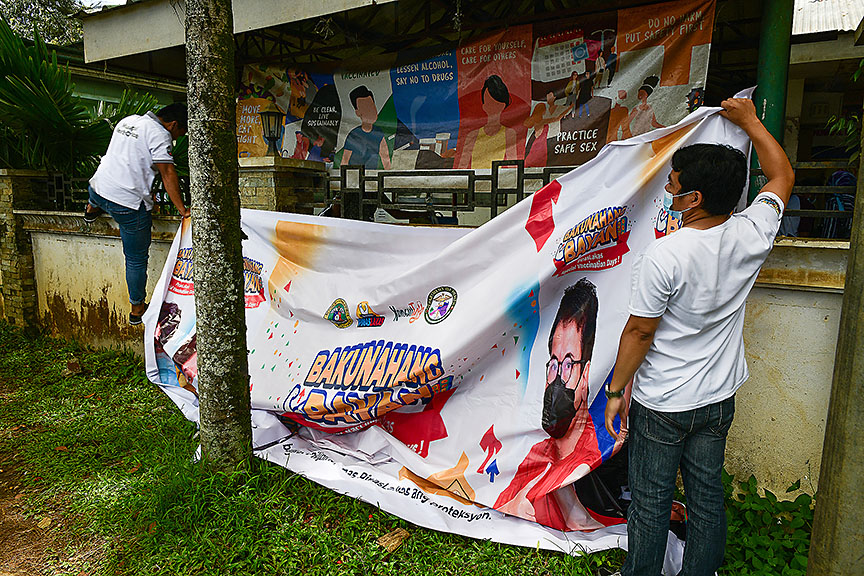TALAKAG, Bukidnon (MindaNews / 27 Sep) – With only a few days left before the September 30 deadline, health authorities here are working double time to meet its COVID-19 vaccination target amid the hesitancy among their Lumad senior citizens.
 Employees of the Talakag municipal health office in Bukidnon put up a tarpaulin signage as part of the information drive for the “PinasLakas” campaign to increase the number of Filipinos getting COVID-19 vaccine shots. MindaNews photo by FROILAN GALLARDO
Employees of the Talakag municipal health office in Bukidnon put up a tarpaulin signage as part of the information drive for the “PinasLakas” campaign to increase the number of Filipinos getting COVID-19 vaccine shots. MindaNews photo by FROILAN GALLARDO
Dr. Mark Anthony Dano, Talakag health officer, admitted they may not hit their 63,000 target even though they have already inoculated 84 percent mainly because they lag behind in vaccinating senior citizens, especially among the Lumads.
“Kulelat kami sa senior citizens, especially among the Lumad. There is a strong resistance to the vaccine,” Dano said.
He said that of the 5,300 Lumad seniors in the municipality, only 3,000 are fully vaccinated and only 700 of them have been inoculated with the first booster shot.
The World Health Organization has expressed alarm over the sluggish COVID-19 vaccination rate among senior citizens in the Philippines and is worried that a surge of cases among the elderly would affect the country’s hospital system.
It said only 6.4 million senior citizens or 25 percent of the vulnerable sector have been fully vaccinated despite efforts by local government units.
At the health center in Talakag poblacion, employees were busy putting up tarpaulin signages as part of the information drive for the five-day “Bakunang Bayan” vaccination campaign last Monday.
Nurses and doctors were attending to a small crowd of residents who came to be vaccinated but senior citizens were conspicuously absent.
“We have no problem with the younger population. It is a different story with the senior citizens, and we are worried of the risks,” Dano said.
He said they tried new tactics, like offering P300 meal allowance as an incentive for the elderly to be vaccinated. They also resorted to a house-to-house campaign to get the senior citizens vaccinated or boosted.
“All of these failed. It seems the Lumad elders are stubborn enough that they rejected even the meal allowance we offered,” he said.
The town of Talakag is a first class town of Bukidnon province. Its population of 77,000 residents is mostly a mix of Higaonon and Talaandig tribe.
Dano said misinformation about the COVID-19 vaccines is the main cause for the hesitancy among its senior citizens.
“The Lumad has this belief that COVID-19 vaccines are harmful to their health. Some of them believed they will get sick if they are vaccinated and some even think they will turn into zombies,” he said.
The Lumad tribal councils in Talakag, the doctor said, even issued certificates that exempt its members from the COVID-19 vaccination. Dano said the health office does not honor the certificates.
He said they tried everything, including engaging Peace Crops, a non-government organization, to produce a variety of information materials like posters, tarpaulins and comics in the Higaonon dialect.
The materials were distributed in barangays Tikalaan, Indulang, Lantud and San Rafael, which have mostly Higaonon residents.
The NGO strategy is that the key to overcoming vaccine hesitancy among the Lumads is a Higaonon-centered and Higaonon-led communication campaign.
Peace Crops president Robert de la Serna said they were able to gain support and participation by featuring in the tarpaulins and posters Higaonon leaders who have been inoculated.
De la Serna said the information materials have a simple message in the Higaonon dialect: vaccines are safe.
 A nurse from the Talakag municipal health office in Bukidnon prepares the COVID-19 vaccine shot for a resident on Monday (26 September 2022). MindaNews photo by FROILAN GALLARDO
A nurse from the Talakag municipal health office in Bukidnon prepares the COVID-19 vaccine shot for a resident on Monday (26 September 2022). MindaNews photo by FROILAN GALLARDO
Jasper Kent Ola, of the Department of Health in Region 10, said health officials sought the help of Higaonon leaders for the effective vaccination campaign in Malitbog, another municipality of Bukidnon.
Furthermore, they gave a sack of rice as an incentive for the Higaonon residents to come to the health centers, according to Ola.
“Once you earned the trust of their leaders, the rest of the Higaonon residents will follow,” he added.
Higaonon leader Rose Undag said the resistance is strong among the elders because the idea of vaccination is not part of their oral history and tradition.
“We do not even have a word for vaccination in our dialect. Our elders do not understand its importance to their health,” she pointed out.
Undag said the Higaonon people resort to medicinal plants when they get sick and trust that “Magbabaya” (Supreme Creator) would heal them.
She said her people would seek the treatment of modern medicine only as their last resort.
Undag said when the COVID-19 pandemic ravaged urban cities, many Higaonon communities refrained from socializing with the people from the urban areas.
“The elders were lucky that most of the local government units implemented strict quarantine measures,” said Undag, who is fully vaccinated and have gotten two booster shots.
On the other hand, she said young Higaonons are also scared by the side effects of the vaccine, pointing out to fevers and chills experienced after being inoculated.
She said the young Higaonons, who are mostly working in the farms, are afraid they would get sick after being vaccinated.
“They cannot afford to be absent from their work even for a single day. It would mean missed meals for their families,” Undag said. (Froilan Gallardo / MindaNews)
(This report was produced through a story grant from the Philippine Press Institute under the auspices of the Hanns Seidel Foundation. The theme of the journalism fellowship is governance and health.)
